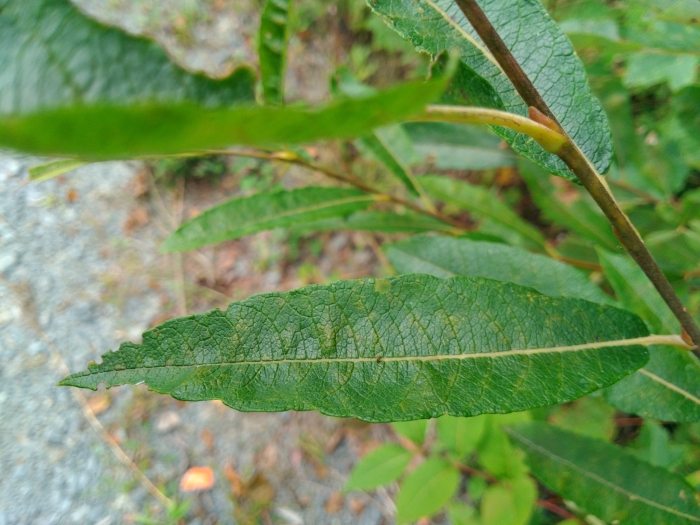Prairie Willow
(Salix humilis)
Prairie Willow (Salix humilis)
/
/

Ben Armstrong
CC BY 4.0
Image By:
Ben Armstrong
Recorded By:
Copyright:
CC BY 4.0
Copyright Notice:
Photo by: Ben Armstrong | License Type: CC BY 4.0 | License URL: http://creativecommons.org/licenses/by/4.0/ | Rights Holder: Ben Armstrong | Publisher: iNaturalist | Date Created: 2017-09-15T11:04:32-07:00 |




































Estimated Native Range
Summary
Salix humilis, commonly known as Prairie Willow, is a deciduous shrub native to a variety of habitats including open woodlands, prairie margins, and along streams and wetlands in the Eastern and Central United States and Canada. It typically grows 2–12 feet tall and may form dense thickets. The stems of Prairie Willow range from yellowish to brown, and the foliage is gray-green to blue-green, with leaves that are narrow and elongated. While the fall color is not particularly notable, the plant is valued for its early spring catkins. Male plants produce showy, yellow catkins, while female plants have green, silky catkins, both appearing before the leaves in early spring.
Prairie Willow is appreciated for its early bloom time, providing an important source of pollen and nectar for bees and other pollinators when few other plants are in flower. It is used in naturalistic plantings, for erosion control on streambanks, and in wildlife gardens. This shrub thrives in full sun to partial shade and prefers moist to wet soils, tolerating occasional flooding. It is adaptable to a range of soil types, provided they have slow to medium drainage. While generally low-maintenance, it can be susceptible to willow beetle and canker diseases.CC BY-SA 4.0
Prairie Willow is appreciated for its early bloom time, providing an important source of pollen and nectar for bees and other pollinators when few other plants are in flower. It is used in naturalistic plantings, for erosion control on streambanks, and in wildlife gardens. This shrub thrives in full sun to partial shade and prefers moist to wet soils, tolerating occasional flooding. It is adaptable to a range of soil types, provided they have slow to medium drainage. While generally low-maintenance, it can be susceptible to willow beetle and canker diseases.CC BY-SA 4.0
Plant Description
- Plant Type: Shrub
- Height: 3-4 feet
- Width: 3-4 feet
- Growth Rate: Rapid
- Flower Color: N/A
- Flowering Season: Spring
- Leaf Retention: Deciduous
Growth Requirements
- Sun: Full Sun, Part Shade
- Water: Medium
- Drainage: Slow, Medium
Common Uses
Bee Garden, Bird Garden, Butterfly Garden, Deer Resistant, Low Maintenance, Water Garden
Natural Habitat
native to a variety of habitats including open woodlands, prairie margins, and along streams and wetlands in the Eastern and Central United States and Canada
Other Names
Common Names: Prärieweide
Scientific Names: , Salix humilis, Salix humilis var. keweenawensis, Salix conifera, Salix humilis var. rigidiuscula, Salix humilis var. hyporhysa, Salix humilis var. angustifolia, Salix humilis f. tortifolia, Salix humilis var. longifolia, Salix muhlenbergiana var. grandifolia
GBIF Accepted Name: Salix humilis Marshall